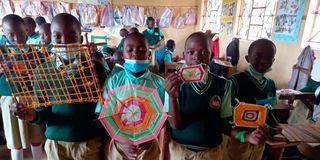Education review team to hold meetings in counties

Grade 4 pupils at Bondeni Primary School in Kitale display woven materials. The education review team will be visiting counties to collect views on CBC and other aspects of education in the country.
What you need to know:
- The team has split itself into smaller units and starts the public engagements on October 31 and concludes on November 11.
- The schedule released by PWPER chairman Raphael Munavu indicates that the public hearings will start at 8 am and conclude at 4 pm.
- Last week, he welcomed written memoranda from the public. The window for receiving the documents closes on November 18.
You can now present your views on the changes you wish to see in education from a centre near your home.
This follows the release of a county tour schedule by the Presidential Working Party on Education Reforms (PWPER).
The team has split itself into smaller units and starts the public engagements on October 31 and concludes on November 11.
The schedule released by PWPER chairman Raphael Munavu indicates that the public hearings will start at 8 am and conclude at 4 pm.
Last week, he welcomed written memoranda from the public. The window for receiving the documents closes on November 18.
In an October 26 circular to regional and county directors of education, Prof Munavu instructed them to get the venues ready for the meetings. He further directed them to communicate with heads of institutions about the venues.
“Please note that the Presidential Working Party will be in every county for two days. They will be visiting institutions within the county for the first day and the second day will be spent at the respective venues for public engagement,” the circular reads.
President William Ruto appointed the 49-member PWPER and gave it six months to submit a report on education reforms. The team is, however, expected to brief the President every two months.
“Prepare a comprehensive education report on your county to be given to the working party. The report should contain information on the number of students, teachers, non-teaching staff, education challenges and other areas relevant to the terms of reference of the working party,” Prof Munavu states.
The Kenya Kwanza government seeks to blend the 8-4-4 system of education that is being phased out with competency and value-based education under the competency-based curriculum (CBC).
Among the most discussed issues are the amount and nature of homework children are given, parental involvement in the learning process and equity. There is also apprehension about preparations for the transition to junior secondary school.
Among the stakeholders that Prof Munavu wants to be invited are vice-chancellors of universities within the counties, university union chapters, representatives of students and non-teaching staff, technical training institution principals and representatives from school boards.
Teachers' unions and associations as well as those of parents are also expected to present their views.
The PWPER’s three main committees will handle matters relating to basic and tertiary education, and cross-cutting issues.
The working party has also created a website for the submission of memoranda. Interested Kenyans can do so at https://educationreforms.go.ke. It has also opened an official Twitter handle.





